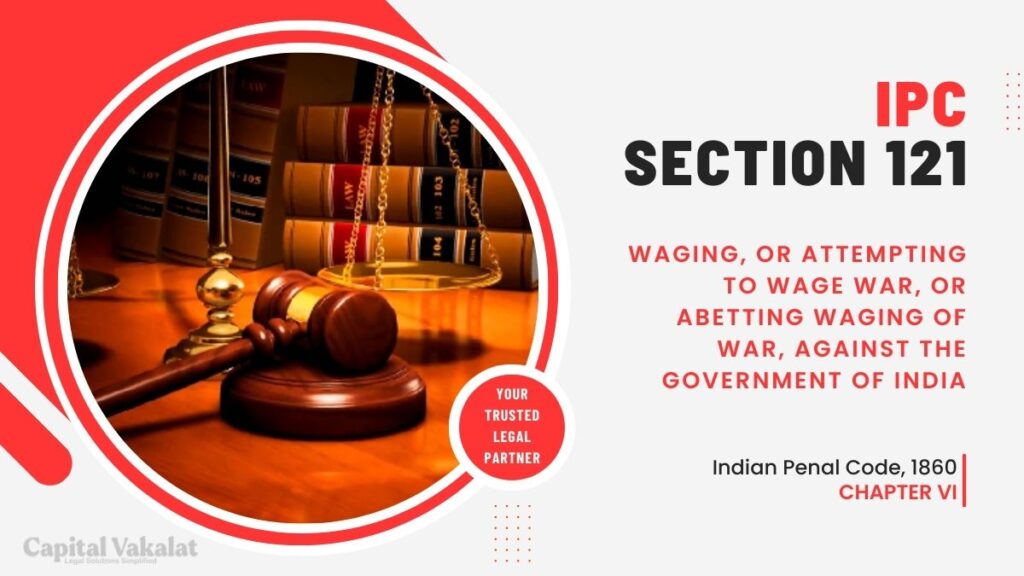In the vast realm of legal provisions, Section 121 of the Indian Penal Code (IPC) holds a unique significance. This section deals with the grave offense of “waging, or attempting to wage war, or abetting waging of war, against the Government of India.”

It is crucial to comprehend the weight of this provision, as it directly impacts national security and the stability of the nation.
Historical Context
The roots of Section 121 IPC can be traced back to the colonial era when the British introduced it to suppress Indian freedom fighters. This provision aimed to deter and punish any act that threatened the supremacy of the British Raj. Over time, this law has evolved but continues to play a pivotal role in preserving the sovereignty of India.
Throughout history, several notable instances have highlighted the significance of Section 121 IPC. From the struggle for independence to more recent acts of terrorism, this provision has been invoked to bring the perpetrators to justice.
Elements of the Offense
Section 121 IPC encompasses several key elements. To constitute an offense under this section, one must either wage war against the Government of India or abet such actions. Waging war involves acts that aim to overthrow the government through violent means, whereas abetting can be in the form of providing support, resources, or even propaganda to further such a cause.
Legal Consequences
The legal consequences of violating Section 121 IPC are severe. Those found guilty can face punishments ranging from life imprisonment to even the death penalty, depending on the severity of their actions. Over the years, various landmark cases and judgments have provided clarity on the interpretation and application of this section, setting important precedents.
Challenges in Prosecution
Proving an offense under Section 121 IPC can be challenging. Given the secretive and often covert nature of such activities, law enforcement faces difficulties in collecting evidence. The accused can also employ various defenses, making prosecution a complex process.
International Perspective
In the global context, waging war against one’s own government is considered a heinous crime with far-reaching implications. Such acts not only jeopardize national security but can also strain international relations. Countries around the world have their own legal provisions to combat such threats, and the prosecution of such offenders can have significant diplomatic consequences.
Role of National Security
Section 121 IPC is closely linked to national security. The government has a duty to protect its sovereignty, and this section acts as a vital tool in achieving that goal. It enables the state to take decisive action against those who pose a direct threat to the nation’s security.
Counterterrorism Measures
In today’s world, counterterrorism has evolved significantly. Intelligence agencies play a pivotal role in identifying potential threats and taking preemptive measures to safeguard the nation. Section 121 IPC is an essential component in these efforts to maintain peace and stability.
Recent Developments
In response to the evolving nature of threats, Section 121 IPC has witnessed amendments and changes. These modifications are essential to adapt to contemporary challenges and ensure the provision remains effective in preserving national security.
Public Opinion
The application of Section 121 IPC has not been without controversies and debates. Public perception varies, with some applauding its role in maintaining security and others expressing concerns about potential misuse. This diversity of opinions raises important questions about the balance between security and civil liberties.
The Way Forward
As India continues to face a variety of security challenges, there is an ongoing discussion about the need for reform in the legal framework. Striking the right balance between preserving national security and protecting individual rights is an ongoing endeavor.
Conclusion
In conclusion, Section 121 IPC stands as a formidable legal provision aimed at preserving the sovereignty of the Government of India. It has a rich historical context and continues to be a critical tool in combating threats to national security. However, as the world changes, there is a pressing need to reassess and adapt this provision to ensure it remains relevant and effective.
FAQs
Is the death penalty mandatory for offenses under Section 121 IPC?
No, the severity of punishment depends on the circumstances and the court’s discretion.
Can individuals be prosecuted under Section 121 IPC for expressing dissent against the government?
Expressing dissent or criticism of the government is a fundamental right, and Section 121 IPC is not applicable in such cases.
Are there international agreements that govern actions against the government, similar to Section 121 IPC?
Many countries have their own laws to deal with such actions, and international agreements address acts that threaten global peace and security.
How can Section 121 IPC be improved to ensure a balance between security and civil liberties?
Policymakers and legal experts are continually exploring ways to strike this balance, and any changes would require thorough consideration and debate.